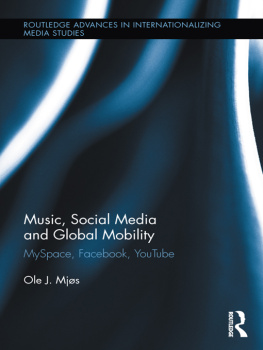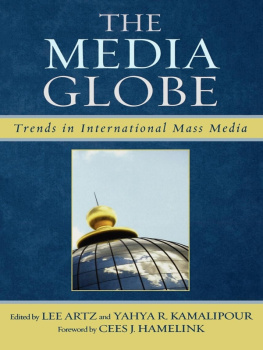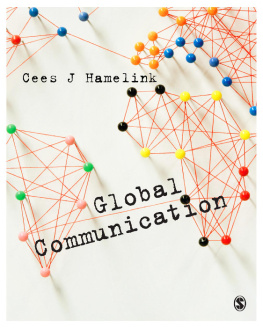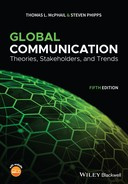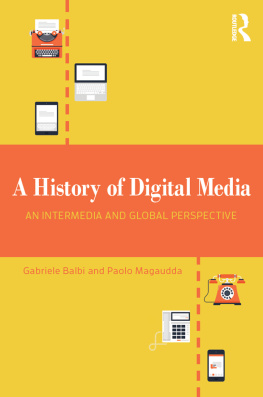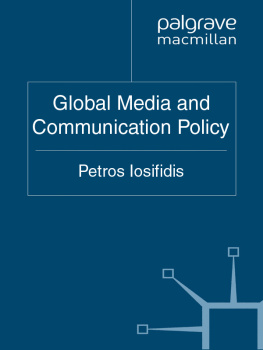Communication and Power in the Global Era
This book revisits how we think about communication and power in the global era. It takes stock of the last fifty years of scholarship, maps key patterns and concepts, and sets an agenda for theory and research.
The book addresses such questions as:
- How are national and cultural identities re-fashioned and expressed in the global era?
- How can we best understand the emergence of multiple and sometimes antagonistic modernities worldwide?
- How are political struggles fought and communicated on the localnationalglobal nexus?
- How do we integrate emerging media environments in global communication studies?
Bringing together essays from a range of internationally renowned scholars, this book will be useful to undergraduate and postgraduate students on Media and Communication Studies courses, particularly those studying globalization and global media.
Marwan M. Kraidy is Professor of Global Communication at the Annenberg School for Communication at the University of Pennsylvania and the Edward Said Chair of American Studies at the American University of Beirut. His latest book, Reality Television and Arab Politics: Contention in Public Life, has won three major awards.
Shaping Inquiry in Culture, Communication and Media Studies
Series Editor: Barbie Zelizer
Dedicated to bringing to the foreground the central impulses by which we engage in inquiry, the Shaping Inquiry in Culture, Communication and Media Studies series attempts to make explicit the ways in which we craft our intellectual grasp of the world.
Explorations in Communication and History
Edited by Barbie Zelizer
The Changing Faces of Journalism
Edited by Barbie Zelizer
The Politics of Reality Television: Global Perspectives
Edited by Marwan M. Kraidy and Katherine Sender
Making the University Matter
Edited by Barbie Zelizer
Communication Matters: Materialist Approaches to Media, Mobility and Networks
Edited by Jeremy Packer and Steve Wiley
Communication and Power in the Global Era: Orders and Borders
Edited by Marwan M. Kraidy
Communication and Power in the Global Era
Orders and Borders
Edited by
Marwan M. Kraidy
First published 2013
by Routledge
2 Park Square, Milton Park, Abingdon, Oxon OX14 4RN
Simultaneously published in the USA and Canada
by Routledge
711 Third Avenue, New York, NY 10017
Routledge is an imprint of the Taylor & Francis Group, an informa business
2013 Marwan M. Kraidy for selection and editorial matter; individual contributions the contributors
The right of Marwan M. Kraidy to be identified as the author of the editorial material, and of the authors for their individual chapters, has been asserted in accordance with sections 77 and 78 of the Copyright, Designs and Patents Act 1988.
All rights reserved. No part of this book may be reprinted or reproduced or utilized in any form or by any electronic, mechanical, or other means, now known or hereafter invented, including photocopying and recording, or in any information storage or retrieval system, without permission in writing from the publishers.
Trademark notice: Product or corporate names may be trademarks or registered trademarks, and are used only for identification and explanation without intent to infringe.
British Library Cataloguing in Publication Data
A catalogue record for this book is available from the British Library
Library of Congress Cataloging in Publication Data
Communication and power in the global era : orders and borders / edited by
Marwan M. Kraidy.
p. cm. (Shaping inquiry in culture, communication and media studies)
Includes bibliographical references and index.
1. Communication, International. 2. Mass media and globalization.
3. Mass mediaSocial aspects. 4. Mass mediaPolitical aspects.
I. Kraidy, Marwan M., 1972-
P96.I5C625 2012
302.2dc23
2012025188
ISBN: 978-0-415-62734-4 (hbk)
ISBN: 978-0-415-62735-1 (pbk)
ISBN: 978-0-203-10207-7 (ebk)
Contributors
Hector Amaya is Assistant Professor of Media Studies at the University of Virginia. He researches in the areas of global media, Latin American film, and Latinas/os media studies. His book Screening Cuba: Film Criticism as Political Performance During the Cold War (University of Illinois Press) is a comparative study of film reception of Cuban film, cultural criticism, and citizenship in Cuba and the USA from the 1960s to 1985. Dr. Amaya is finishing a second book, titled Citizenship Excess: Latinas/os, Media, and the Ethics of Nation, in which he investigates neoliberalism on American citizenship, Latinas/os, and media.
Paula Chakravartty is Associate Professor of Communication at the University of Massachusetts, Amherst. Her teaching and research cover the political economy of communication, communication policy and cultural studies. She is the co-author of Media Policy and Globalization and the co-editor of Global Communications: Towards a Transcultural Political Economy. Her recent publications include research on news cultures and democracy, race, empire and the global financial crisis, the corporatization of info-development and the postcolonial history of communication and global governance.
Andrew C. Crocco is a doctoral candidate at the Annenberg School for Communication, University of Pennsylvania, researching urban space, the built environment, and communication. His dissertation will examine the role of city-building in the construction of citizenship in the United States, looking to Philadelphia between 1830 and 1850, a time when social and economic upheavals redrew boundaries of race, class and citizenship. Analyzing the material construction, practical functions, and symbolic meanings attributed to the built urban environment, his research explores the relationship between evolving ideas of citizenship and the lived experience of the city. Crocco has taught Comm300: Public Space, Public Life at the University of Pennsylvania and was a Center for Teaching & Learning Graduate Fellow in 201011.
Myria Georgiou teaches at the Department of Media and Communications, London School of Economics (LSE). Her research focuses on the study of diaspora, transnationalism and the media, as well as on the city as a space of contact, communication, and conflict. She has just completed a cross-European research project examining the relation between Arab-speakers sense of belonging and transnational television consumption across Europe. She is currently writing a book, titled Media and the City (forthcoming, Polity Press).
Le Han is a doctoral candidate at the Annenberg School for Communication, University of Pennsylvania. She got her masters degree in communication at Chinese University of Hong Kong. Her research interests include global communication, diaspora, and collective memory.
Anik Imre is an Associate Professor of Critical Studies at the School of Cinematic Arts of the University of Southern California. Her publications on media globalization, media education, consumption and European identities have appeared in Screen, Camera Obscura, Framework, Third Text, CineAction, Signs, The European Journal of Cultural Studies, Feminist Media Studies, Media International Australia


